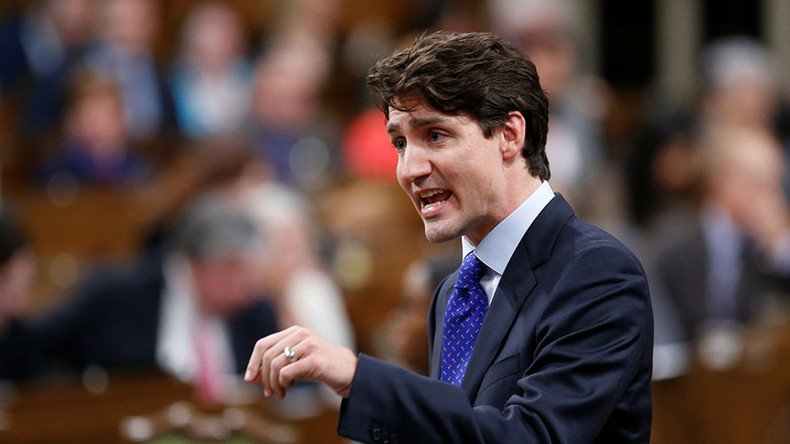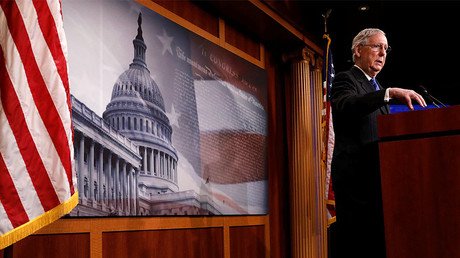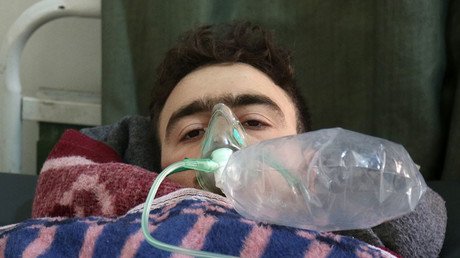Canada jumps on bandwagon of countries mulling tougher Russia sanctions

Canada’s prime minister says he will consider hitting Russia with stiffer sanctions amid the Syrian crisis, after the US and UK said they were mulling the same possibility. It comes as G7 countries prepare to discuss the topic during a meeting in Italy.
Prime Minister Justin Trudeau said on Monday that he believes “Russia needs to be aware, made aware of its responsibility in the bloody actions last week by the Assad regime and therefore we are always open to working with our friends, allies and partners allies to send clear messages through sanctions and other means to Russia,” as quoted by Reuters.
He went on to state that although Canada already has strict sanctions in place against Russia, his country is “always ready to strengthen those sanctions in concert with the international community.”
Trudeau, speaking to reporters at a military commemoration ceremony in France, also said that Canada fully supported US missile strikes on a Syrian airbase which killed 14 people – including nine civilians – last week.
The US missile strikes came after a chemical attack in Syria killed 86 people, including dozens of women and children. The US and its Western allies have placed the blame on the Syrian government, despite not presenting any evidence to prove Damascus was behind the deadly attack.
Meanwhile, Russia’s Ministry of Defense (MoD) says the chemicals were released after the Syrian Air Force destroyed a rebel-held warehouse where such weapons were being produced and stockpiled before being shipped to Iraq. The MoD has confirmed that information as “fully objective and verified.”
Canada is not the first Western country to voice the possibility of more Russian sanctions following the chemical attack in Syria. Earlier on Monday, British Prime Minister Theresa May’s spokesperson said the UK government is considering how to put “further pressure” on backers of the Syrian government, including Russia.
READ MORE: Syria could become US-Russian proxy war – Jeremy Corbyn
Also on Monday, British Foreign Secretary Boris Johnson said Russia must decide whether it will stick with the “toxic” Assad government or work with the rest of the G7 on a political solution in Syria.
Johnson added that the UK and fellow G7 nations – France, Germany, Italy, the US, Canada, and Japan – will be discussing the possibility of further sanctions against Syrian and Russian figures during a meeting in Lucca, Italy, this week.
“We will be discussing the possibility of further sanctions certainly on some of the Syrian military figures and indeed on some of the Russian military figures who have been involved in coordinating the Syrian military efforts,” Johnson said in a television clip shown on Sky News.
On Sunday, the US envoy to the United Nations, Nikki Haley, told CNN that President Donald Trump is also considering sanctions against both Russia and Iran.
Meanwhile, US Secretary of State Rex Tillerson also accused Russia of “failing” to “live up to its commitments under the chemical weapons agreements” in relation to the current situation in Syria.
But while the US and its allies continue to support the deadly missile strikes on the Syrian airbase despite a lack of evidence, Belgian Foreign Minister Didier Reynders has stepped up to say that Trump’s decision was outside of the UN framework, and that further decisions must go through it.
Moscow has decried the US bombing of the Syrian airbase as being an “aggression against a sovereign nation” in violation of international law, stating that it was conducted “under an invented pretext.”
Iran has also slammed the missile strikes, with President Hassan Rouhani stating that “all terrorists in Syria are celebrating the US attack,” despite Trump claiming that he wants to fight terrorism.
The US and EU have already placed a number of economic sanctions on Russia, as punishment for its alleged role in the Ukraine conflict which led to Russia’s reunification with Crimea, following a 2014 referendum. That same year, the Kremlin responded with a broad embargo on food imports from all countries which slapped Russia with sanctions.














